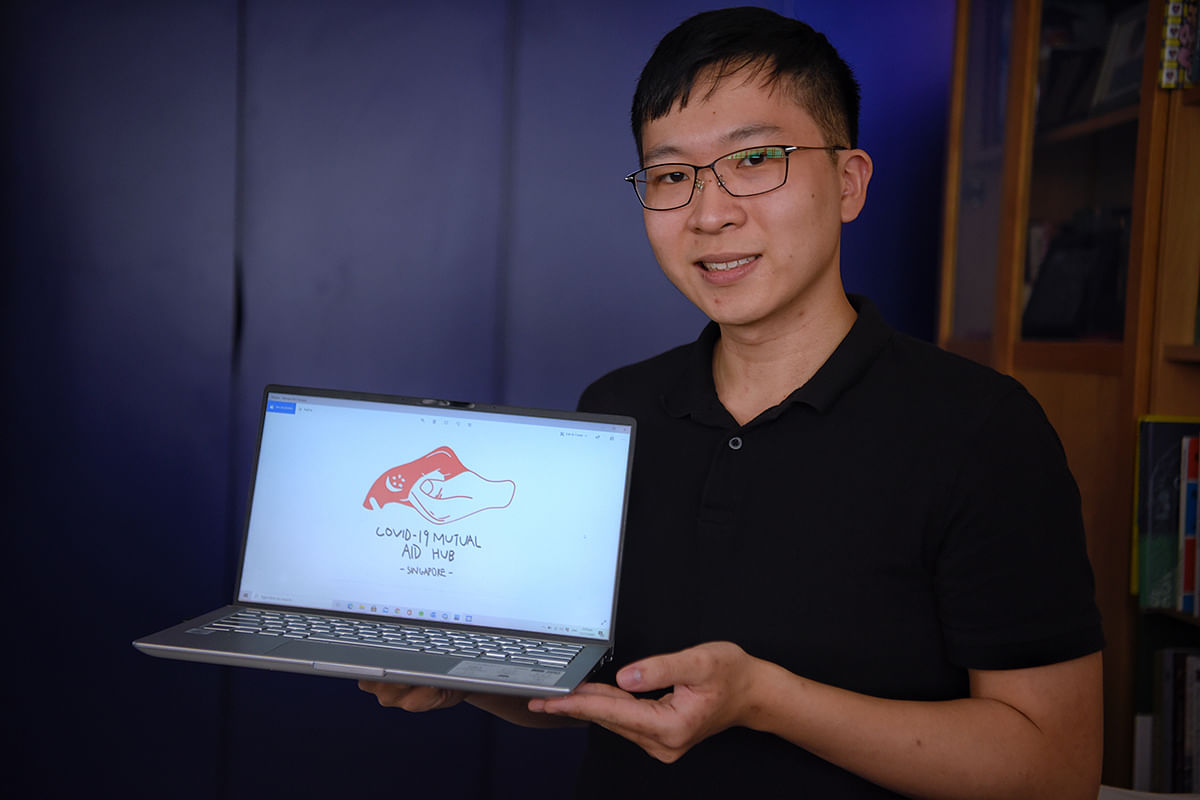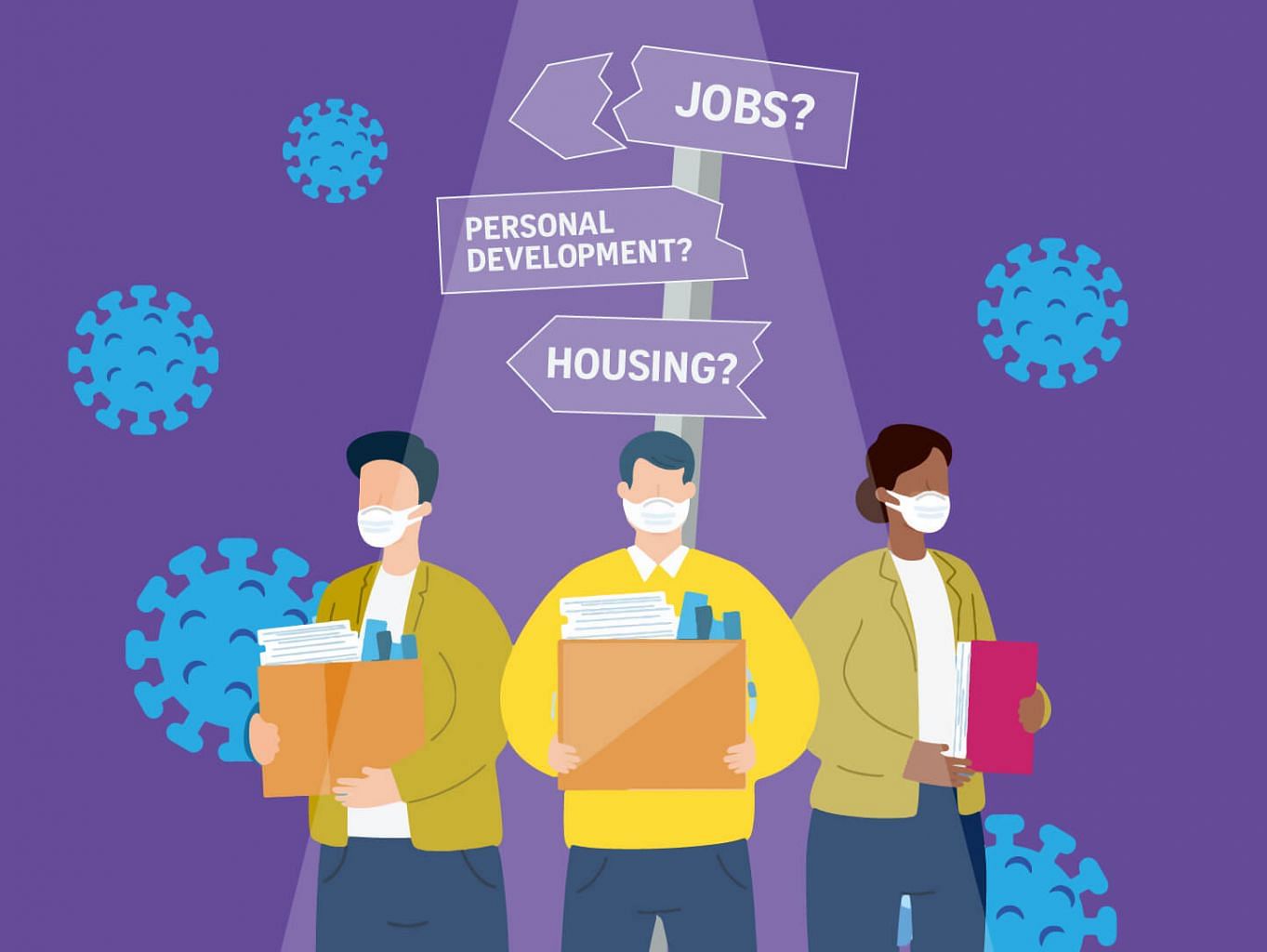Tailor Vikas Kumar, 25, from India's eastern state of Bihar, had ambitious plans for the next two years.
After chalking up seven years' experience at a textile firm in Mumbai, earning about 25,000 rupees (S$450) a month, he had planned to strike out on his own and start a small tailoring business.
He had also wanted to upgrade his mud and straw hut in Bihar, which houses his parents, wife and two children, into bricks and mortar.
But the pandemic waylaid these plans.
The lockdown imposed by the Indian government in March prevented him from going to work, forcing him to return home in May.
His savings of 100,000 rupees have all been used up now, to ensure that his family survives this difficult phase, leaving no spare cash for rebuilding.
Work has not resumed fully enough at the textile firm to convince Mr Kumar, who was paid by the day, to return to Mumbai. Neither are there opportunities for someone like him - his family does not own farming land - back at his village.
"This year has been wasted," laments Mr Kumar, who has put his plans on hold till 2022.
His story of how the pandemic disrupted life plans and undermined financial security is one that is experienced by young people across Asia.
With most economies in the region still reeling from the fallout of the pandemic, fears are mounting over the prospect of the creation of a "lost generation" in Asia - home to more young people than any other region.
This lost generation may be scarred economically, socially and psychologically by the far-reaching effects of the coronavirus crisis, which has been more consequential than past crises due to the unprecedented extent of its impact, experts say.
Social distancing measures have not only dealt a blow to businesses, but also taken a toll on individuals' mental well-being and disrupted global supply chains.
Unemployment rates among young people have also seen a bigger increase than that those for adults, preliminary data from the International Labour Organisation (ILO) indicates. For unemployment data, the ILO defines youth as those aged 15 to 24.
Young workers must also contend with "wage scarring effects", with research indicating that those who find employment after recessions may have to deal with a lasting negative impact on their productivity and wages, said the ILO.
This may have an impact on the life trajectories of a younger generation, warns Professor Jean Yeung, founding director of the Centre for Family and Population Research at the National University of Singapore.
Without a smooth transition into the job market, it can be difficult for youngsters and young adults to embark on other significant adulthood events, such as marriage, parenthood or setting up their own households, she adds.

"The longer the current crisis lasts, the harder it is for the youth to recover from its negative impact. With no effective interventions, they could very well become a lost generation."
Such fears are palpable in Japan, where an expert panel at the country's labour ministry has urged efforts to support new graduates to avoid another "employment ice age". This refers to the period after the burst of the asset-price bubble era of the 1980s, in which fresh graduates could not find any jobs and were stuck in a vicious circle of irregular dead-end contract unemployment.
Due to Covid-19, the number of people who graduated from university or high school without finding a job in Japan is expected to increase rapidly in 2021, from 20,000 in 2020, though no estimates for next year are available.
According to an August report by the ILO on youth unemployment in Asia-Pacific, the unemployment rate for those aged 15 to 24 in Hong Kong, Japan, South Korea, Malaysia, Thailand and Vietnam increased from the fourth quarter of 2019 to the first quarter of this year.
This was a more significant increase than that for the unemployment rate for adults aged 25 and above in these countries.
And more than 100 million young workers in Asia and the Pacific - nearly one in two young workers in the region - are also employed in sectors experiencing a hit to their economic output due to Covid-19, based on preliminary estimates for 2020, notes the ILO. These sectors include accommodation and food services, and wholesale and retail trade.
While youth in Asia are worried about their job prospects, many fresh graduates and young workers are tempering their expectations or settling for temporary jobs or traineeships while holding out for better opportunities.
The UN Population Fund has also projected that birth rates will continue to drop in many higher-income countries, and climb in many poor and middle-income nations, where it says pandemic-driven disruption in access to contraception may lead to millions of unplanned pregnancies.
This trend is borne out in Japan, where the number of reported pregnancies nationwide fell 11.4 per cent between May and July compared with the same period last year, due to rising of economic pressures from the outbreak. Women typically report their pregnancies within their first trimester.
On the other hand, 77 per cent of 1,754 married women who were surveyed in Indonesia have been pregnant during the pandemic, according to a survey by market research firm Populix, conducted from Sept 3 to Sept 10.
In developing countries, a surge in birth rates may snowball into wider inequality gaps, while developed countries like Japan, Singapore and China may face a tightened labour supply if birth rates continue to fall due to the crisis, observers have noted.
Housing markets in Indonesia, China and Malaysia have also been hit, though some prospective home owners still find opportunities.
In India, for instance, more millennials are looking into buying a house, given that they are spending the majority of their time in their houses in the Covid-19 era, says Mr Ankit Kansal, the managing director of property brokerage firm 360 Realtors. Housing markets in Indonesia, China and Malaysia have also been hit, though some prospective home owners are still finding opportunities.
Whether these economic and social trends will curb the potential of Asia's economies, which is expected to contribute roughly 60 per cent of global growth by 2030, will depend on how long the pandemic drags on and the quality of government intervention measures to mitigate the crisis' impact.
More training, internships and mentoring opportunities must be provided to young people, and vulnerable groups, such as lower-income families, need more protection, says Prof Yeung.
Asia
• 42% of workers in Asia* aged 18-29 have experienced a fall in income since the onset of Covid-19.
• More than 100 million: Number of young workers in Asia and the Pacific employed in sectors experiencing high impact on their economic output, including accommodation and food services, manufacturing, wholesale and retail trade.
In Singapore, more than 117,500 jobs and training and attachment opportunities have been created for local job seekers.
The Chinese government has also been taking steps to discourage firms from retrenching workers, notes OCBC Bank head of Greater China research Tommy Xie.
Mr Xie is still optimistic that the technological changes that have been hastened by the pandemic will bring about new opportunities for the young. "Youth can take more paths to success compared with the older generation, such as by capitalising on social media," he says.
Adds OCBC economist Wellian Wiranto: "If the global economy can get back to some kind of normalcy by the end of next year, we probably still have a chance of reverting back to (pre-pandemic) potential growth levels."

Personal development
Singapore's young people galvanised into action amid Covid-19 crisis

SINGAPORE - Until the coronavirus pandemic came along, freelance consultant Isaac Neo, 26, had not been involved in organising any social initiative in Singapore.
But when he read about how vulnerable groups, including migrant workers and low-income earners were suffering amid the crisis, it prompted him and eight others to start the Covid-19 Mutual Aid Hub in April.
The hub is a search portal which consolidates ground-up initiatives to make it easy for those in need to find help.
The act of volunteering for this, and talking to others around him affected by the crisis, gave the political science graduate insights on social welfare and inequality.
He says more should be done to make financial relief schemes more accessible to the lower-income group.
"Before Covid-19, these issues were abstract, but I saw the impact of the crisis, and it has really helped to open my eyes (to these issues)."
Mr Neo is among several young people in Singapore with whom The Straits Times spoke who say that while the crisis has upended their life plans, it has prompted them to reassess what values they believe should undergird society, and galvanised them into action if they saw a need.
Cambridge University undergraduate Leia Devadason, 21, says the extra downtime and heightened political consciousness she gained amid the pandemic provided an opportunity for her to set up a political website, Grassroots Level Party, with her friend Megan Lim, 21, in late March.

The music student had returned to Singapore from Britain in March due to concerns over Covid-19 there.
The site, which provided basic information about elections and the political system in Singapore ahead of the general election in July, was widely circulated, climbing to an average of 2,000 views per day in the weeks leading up to Polling Day, says Ms Lim, a student at the School of Art, Design and Media in Nanyang Technological University (NTU).
Echoing Minister for Culture, Community and Youth Edwin Tong, who said in Parliament in September that rapid changes in Singapore's socio-political environment have been catalysed by the Covid-19 situation, Ms Devadason says it has served as a reset button prompting young people like her to reassess their place in society, and consider how policies affect their lives.
Ms Lim adds that social media provided an accessible avenue for the young to engage one another in conversations about politics and policies with their peers even as social distancing rules were in place.
"It felt like a breakthrough point where something in the old society was being put to rest, and we were in a position where we can imagine how we can take ourselves forward," says Ms Devadason.
Having been exposed to the societal inequalities that Covid-19 has laid bare, she hopes to see a more equitable and compassionate society that is open to dissent and critical discourse.
The pandemic has also shaped the views of young people on various social issues.
According to the National Youth Council (NYC), youth participants at a Emerging Stronger Conversation in late September expressed concern about the power asymmetry between employers and migrant workers. They were also concerned about challenges faced by lower-income workers, and said more could be done to support local food production.
Ms Megha Saha, who volunteered as a English-Bengali translator for the migrant worker community when Covid-19 cases peaked in dorms, also says her involvement in these efforts opened her eyes to issues confronted by migrant workers in Singapore, such as how migrant workers may face barriers in accessing healthcare.
The 23-year-old, who works in the tech industry, believes that support for migrant workers in Singapore should be stepped up.

The mental well-being of many young people has also been affected by the pandemic, as they face anxiety over an uncertain future, and stress over work and academics, among other things, an NYC spokesman told ST. According to a poll of 1,000 young people aged 16 to 34 in August, one in two respondents said that Covid-19 has had an impact on their mental well-being.
But at the same time, awareness of such issues has grown, with more young people stepping up to reach out to their peers struggling with mental health issues, says Mr Asher Low, executive director of Limitless, a non-profit organisation that works with young people.
While the pandemic has presented great challenges, Singapore's young people have also persistently proven themselves to be resilient and adaptable individuals, added the NYC, which has partnered integrated marketing agency DSTNCT to collect stories of Singaporeans' Covid-19 experiences.
This includes young people like Ms Ameline Tan, 24, who got engaged last year and had planned to get married in August this year.
The marketing executive had to call off her wedding and return a resale flat to the Housing Board after breaking up with her fiance in June, after the circuit breaker.
Not being able to see each other due to Covid-19 restrictions during circuit breaker created a lot of misunderstandings between them, she says, and also accentuated differences in personality and values between her and her fiance.
Though the break-up cost her thousands of dollars in forfeited deposits, Ms Tan says that in hindsight, she was lucky to have discovered these issues with her fiance before committing to marriage.
"I have gained more than I lost," she says. The break-up also drew her closer to her family, with whom she got to spend more time during the circuit breaker, and who quietly supported her through her relationship difficulties.

Ms Devadason, who had two summer programmes in music writing and conducting in Germany and Britain cancelled due to Covid-19, says the pandemic has taught her how to better deal with uncertainty.
"I'm used to planning ahead and being guided by a sense of direction, but my plans fell through, and it has given me a sense of perspective. Covid-19 has disciplined me into taking things as they come.
"There isn't really a set path that you have to take at a certain point of time, but rather there are many paths, and you are just travelling on one of them, and it's okay."
Singapore Management University law don Eugene Tan says Covid-19 has appealed to young people's belief that they have to be even more engaged, especially given the Government's emphasis on remaking Singapore for the post-Covid-19 world.
"There is an acute sense among some youths that they have an important stake in the future. (They) seek to ensure that that their views and concerns are taken into account and engaged with in a purposeful manner.
"How we tap those inner convictions and aspirations will matter. The worst is to be patronising about them and towards the youth."
Young Asians work on personal development amid pandemic challenges

NEW DELHI - As with many young entrepreneurs across the world, Mr Rohit Raman, who ran a successful printing and design firm in New Delhi, was hit hard by Covid-19.
He had to wind up his business in June, draw on support from his parents to repay loans, help find jobs for 20 employees he laid off, vacate the flat he rented and return to live with his parents in Bihar - all of this culminating in a tailspin that led him to be clinically diagnosed with depression.
But the 33-year-old has pulled back from the precipice, and turned the pandemic into an opportunity.
Mr Raman, who had enrolled for an undergraduate law programme in 2017, finished it in September this year and found himself a new role that he will take up this month - a consultant position at a trust that works with the government on its skill development initiatives for the marginalised.
It has been quite a transformation for Mr Raman - from being his own boss, which led him to develop an erratic routine, to a disciplined daily regimen recommended by his psychiatric counsellor.
A late riser until a few months ago, he now begins his day at 3am with morning yoga and a run, followed by a focused study session to help him prepare for his new job.
"I am ready to head out by 7am these days," Mr Raman, 33, tells The Straits Times.
"Covid-19 has filled a gap for me. I have reskilled myself and changed my attitude towards work and to life. It has helped me understand where I was lacking.
"I even took feedback from family and close friends and adapted their suggestions to improve myself.”
While Mr Raman regrets losing a thriving business, he does not want to keep looking back.
"I had never thought that things would go this way, but the pandemic has compelled me to move on," he says. "I have to survive with what I have because opportunities are few and far between."
And while he has overcome professional challenges and even successfully battled depression, Mr Raman and his wife, who were married in 2018, have put off their plans to have a child for another year at least.
He says: "I cannot bring someone into this world when I don't have enough money to run my livelihood. How can I compel another person to live the same way as I am now?"
Less focus on settling down
Young people across Asia are fighting battles similar to Mr Raman's, prioritising careers and financial security amid the pandemic's turmoil and focusing less on marriage and parenthood.
A survey conducted in March to April found that 19 per cent of Indian millennials were not interested in either marriage or having children.
In Japan, the number of marriages between May and July fell 36.9 per cent from last year. The number of reported pregnancies also fell 11.4 per cent in the same period.
Hong Kong, too, has seen a similar growing trend of marrying later or not at all among both genders in recent years.
A public relations professional based in the city, Mr Matthew Lai, 28, says he has delayed plans to get married, as his partner has been stuck in Shenzhen.
"It has delayed our marriage plans and it might delay us having kids and other things – but the plan is still there," he says.
In some cases, the pandemic also provided couples the opportunity to end abusive relationships.
In Kuala Lumpur, Ms Nadia Abdullah, 32, a mother of two, walked out of an unhappy marriage.
Being "locked up" for several months in the same house with her husband during a partial lockdown convinced her that life is too short to spend it with someone abusive.
"For eight years, I put up with his every whim, verbal abuse and infidelity. He knew how much I loved our little family, that's why he used it as a "weapon' to control me," the kindergarten teacher tells ST.
Her divorce was finalised in September. "I've been happier since," she says.
There are also those like Ms Shailja Tandon, a 30-year-old research associate at a Delhi-based social science institution, who thinks the pandemic would not have held her back from marrying if she found someone compatible.
"I'd much rather prefer the intimate pandemic version of a wedding, which involves less of societal traditions and is more about the couple's union," she says.
"The pandemic has acted like a good catalyst to let go of certain practices, such as those related to gifting, that weighed more heavily on girls and their families, ones I have always been against," Ms Tandon adds.

Jobs
Job market hit by pandemic, but Singapore's youth soldier on

SINGAPORE - Finding a job and starting a career should be a thrilling time for young people, but with the pandemic strangling the job market, the experience has been daunting and anxiety-inducing instead.
Some graduates had job offers withdrawn, while others their internships cut short. Some began new jobs only to end up having to switch to other paths when things did not work out.
But there's something about the resilience and optimism of youth that is seeing them through.
Nanyang Technological University (NTU) business graduate Rachel Tsang, 23, who had some job offers withdrawn, says: "I was emotionally affected by my circumstances although I knew that it was not my fault since the economy was not doing well and it was not in my control."
Like this year's crop of fresh graduates, she officially left school in July.
She decided to look for learning opportunities and the chance to gain transferable skills. She is now a trainee in a role aligned with her interests in sustainability.
Employment situation in Singapore
41,300
Preliminary estimate of the number of residents below 30 who were unemployed in June 2020.
2.4
The number of people under 30 who were retrenched in Q2, 2020 per 1,000 local employees.
7.3%
Resident unemployment rate (seasonally adjusted) for those below 30 in June 2020 - higher than in March 2020 (6.8%) as well as in June 2019 (6%).
13.5%
Proportion of retrenched locals in Q2, 2020 who are below 30.
NTU engineering undergraduate Lim Xuan Zheng, 25, found his six-month internship in Israeli construction start-up CivDrone cut short when the Government recalled overseas students.
He says: "Finding an internship placement was particularly difficult when I came back to Singapore."
Although he had planned to apply for product management roles ahead of his graduation next May, he says he might look for a more technical job instead, which could be less competitive.
NTU business student Muhammad Irfanullah Mohamed Kasim Amanullah, 24, had his internship in Ethiopia cancelled. The internship had come with a scholarship and the chance for it to be converted into a full-time job.
"As long as I am willing to learn and adapt to the changing environment, I believe I will be able to secure a job in the future," he says.
"To help me stay relevant in the job market, I have been taking courses on (online education platform) Coursera. By upskilling myself during this period, I believe I will be able to pursue my career aspirations even if Covid-19 is around for the next few years."

The Ministry of Manpower estimated that some 41,300 residents below 30 years old were unemployed in June, according to preliminary figures.
The seasonally adjusted resident unemployment rate for those below 30 stood at 7.3 per cent, higher than the 6.8 per cent in March this year and the 6 per cent in June last year.
Arts management graduate from the Nanyang Academy of Fine Arts Priscilla Wee, 23, says the search since May for jobs such as gallery assistant or arts programmer has been tough.
She says, "(I) am slowly starting to think about expanding my search to other companies and maybe try a marketing job. It's not been easy... and I've had to change my expectations for not just salary but also job security."
Singapore Management University (SMU) business student Victoria Neo, 23, says she might also expand her options from jobs in marketing and branding to entrepreneurship in the online space.
"I think it really puts what I want to do in the future into perspective; it's so uncertain," she says.
Some young people are opting for traineeships in the meantime to gain experience.
SMU law student Gwee Jia Wei, 23, who is a trainee at the Centre for Research on Successful Ageing, says: "I think taking on internships would definitely help, as (it) proves you have exposure and some training."
Fellow trainee and economics graduate Yew Jee Yuen, 27, still hopes to find a research-related job when things improve.
"While the emergence of the pandemic made it difficult to secure full-time opportunities, and may have temporarily disrupted my career plans, I still aspire to do what I originally set out to do."
National University of Singapore Associate Professor Ho Kong Chong says: "They want to find short-term safe harbours, but they haven't given up on their dream jobs. In the meantime, they're trying for something short-term until opportunities open up again."
Republic Polytechnic graduate Nur Sakinah Mohd Noor, 21, says the job hunt since May has been challenging, as she had to compete not just with fellow graduates, but also with workers who were retrenched.
So, she decided to take a traineeship as a sales administrator with manufacturer 3D Metalforge.
"I couldn't afford to wait until I landed a full-time job. I felt like I was wasting a valuable opportunity if I did not sign up for such a programme," she says.
"This will also mean I can polish my resume by including the skills I have acquired during the traineeship. Aside from getting skills and knowledge and a boosted resume, the company may convert trainees to a full-time position. I believe there is nothing to lose."

Berklee College of Music graduate Cherie Rui Min's plans of a music career in Los Angeles also went up in smoke. Instead, the 24-year-old came home, launching music school Vine Music Studio this year. She also organised an online charity concert to help underprivileged women.
"We have to adapt and find ways to pursue our passions while making a living," she says.
But even those who had jobs have had to grapple with newfound uncertainty or find extra sources of income.
Ms Tan Hui Lin, 23, worked in the family business, managing beauty pageants with her mother.
She says: "Events were the main source of our family's income and the pandemic caused a significant impact, as everything was held up."
So Ms Tan tapped her entrepreneurial vein, creating floral arrangement business Blooms & Buds SG and a home-based pork slider bun business called Kiap It! She is also exploring jewellery sales online.


She is not the only one. Emcee and sports coach developer Elson Leong, 30, conducted online training, delivered parcels and even managed swab testing sites when the pandemic put a stop to physical events.
He says: "I have taken an optimistic attitude towards all that has happened. I am open to exploring more options if opportunities arise."

Some juggle work and school, like SMU economics undergraduate Jarrod Wong, 23, who is also working with IPP Financial Advisers. "I think that financial advisory will always be in demand and is perhaps even more important when the economy is volatile and uncertain," he says.
Paradoxically, the pandemic has instilled flexibility and adaptability in this generation, experts say.
ManpowerGroup Singapore country manager Linda Teo says: "The pandemic may have also prompted some to re-evaluate their career plans, with some deciding to switch to jobs that help them to gain a greater purpose in life or industries with more growth opportunities."
NTU Associate Professor Trevor Yu says: "The challenging conditions of the job market may suggest that people may be more willing to explore different types of career paths, compared to the traditional climbing of corporate ladders, and non-standard work arrangements, such as contract-based or part-time work and apprenticeships."
And all is not lost, as the pandemic has expanded the realm of possibilities, for instance by allowing people to work remotely for overseas firms, says SMU Professor Paulin Straughan.
"It has shifted us to imagine a little bit more. In the past, graduates are very traditional and stick to big firms, but now they look around and see which companies have risen from this."
Asia's young people adapt amid changing job prospects

TOKYO - Mr Toma Tajima, who will be graduating in March next year, suffered rejection after rejection when looking for his first job.
He tells The Straits Times: "I was extremely depressed, to the point that I was on the verge of giving up my job search altogether this year."
The 21-year-old undergraduate at the Kanda University of International Studies was looking for a job in global trade, logistics or real estate sales, but kept hitting a dead end, with these sectors badly hit by the Covid-19 downturn.
After being rejected by 30 companies in a "gruelling and endless process", Mr Tajima instead started looking at jobs in growth sectors such as information technology and manufacturing.
He has since accepted a position working in sales at a manufacturer of machine presses.
While it was not quite what he had wanted to do, he says: "I was incredibly happy, and will use the role to gain experience and figure out my desired career path."
A promised job offer, however, did not materialise for Ms Itoi, 23, who graduated from one of Japan’s top art universities this year. She wants to be known only by her last name.
Though she was to start work in April at a fashion events company, the offer was rescinded. Her parents urged her to apply for a contract position until March next year – under a scheme by the Tokyo Metropolitan Government (TMG) to support those whose employment has been hurt by the Covid-19 crisis.
Ms Itoi now works in TMG’s General Affairs Disaster Prevention Office – a role which she admits is "a 180-degree turn from my dream job".
She remains on the hunt for more secure employment - hopefully in her area of interest - but adds: "There is a silver lining in how I am now exposed to different skill sets working in the civil service, an area I otherwise would never have touched."
There are many across Asia like Mr Tajima and Ms Itoi, with the Covid-19 crisis having hurt job prospects for a whole generation of young people.
3%
Japan’s overall jobless rate in September, unchanged from August and the highest since May 2017.
9.9%
The jobless rate for those aged 20 to 29 in Hong Kong in the second quarter. It was 5.2 per cent in the same quarter last year.
32.5%
Projected unemployment rate this year among those aged 15 to 24 in India, from 23.3 percent last year.
7 million
Number of people in the Philippines who lost their jobs during the two-month Covid-19 lockdown that began in March.
Japan's overall jobless rate stood at 3 per cent in September, unchanged from August and the highest since May 2017.
But the data released last month by the Labour Ministry was driven up by the jobless youth. Only two age groups had a jobless rate of above 3 per cent – those aged 25 to 34, at 4.8 per cent, and those aged 15 to 24, at 4.3 per cent.
It is a similar story in Hong Kong, where the jobless rate for those aged 20 to 29 is on the rise. In the second quarter, the figure jumped to 9.9 per cent, from 5.2 per cent in the same quarter last year.
The uncertainty has led professional Matthew Lai, 28, to temper his expectations for career progression and salary growth.
He admits to being in a better position than many others, noting that some friends have been thinking about switching jobs. "During this period of time, a lot of people are cautious - they'd rather have something instead of nothing."
A report by the International Labour Organisation and the Asian Development Bank showed that the unemployment rate among those aged 15 to 24 in India could surge to 32.5 per cent this year, from 23.3 per cent last year.
Over in the Philippines, more than seven million people lost their jobs during the two-month lockdown that began in March.
Among them was Mr Roberto Diez, 28, who worked at an advertising agency. Like many others who suddenly found themselves without jobs, he tried his hand at online retail, selling sweets a brother would source from suppliers outside Manila.
"But it was too much work, and the returns were too small because we didn't have scale," he says.
The ad man has since found a new job at another company, but says: "The pay is lower, and I'll again have to start at the bottom. But it's better than nothing."
In Malaysia, former draughtsman Adnin Abidin, 31, says he is now willing to take up any job, so long as he can pay his bills and afford to buy milk powder for his newborn son.
"I now work as a lorry driver. It doesn't matter what job it is; as long as it's halal, I'd do it," he says.
"Beggars like me can't be choosers, not when the pandemic has left many jobless."

Housing
Some young Singaporeans rethink BTOs, others their current living arrangements

SINGAPORE - First apply for a Build-To-Order (BTO) flat, then have a wedding three to four years later.
Such is the plan - one might even call it a template - for many young Singaporean couples, so much so that the pragmatism has passed into urban legend here.
But in a time of Covid-19 , the "BTO first, marriage later" path in life has come under strain.
In the August sales exercises of these flats, which are available to Singaporeans who do not own any other property, the expected completion date of some BTO projects was pushed back to four to five years, instead of the usual three to four.
For content creator Charlotte Wang, 27, and her boyfriend of two years, the longer wait for a BTO flat meant that they would have to either live with their parents or rent a flat - neither of which appealed to them.
On top of that, she had quit her role at a marketing agency at the beginning of the year to take a two-month break, which then became extended unemployment when she could not find a new job. Her 27-year-old boyfriend, who works as a financial consultant, also saw his income dip.
The couple are now forsaking their BTO plans and thinking of buying a resale flat next year.
Singapore
• Those aged 22-32 in serious relationships: 30% would delay their plans to get married.
• Those aged 21-45 and are married: 30% would delay their plans to have (more) children.
"The pandemic made things a little uncertain for us financially. So we agreed we would save up for a year and hopefully by the end of next year, we will be able to afford a resale flat and a small wedding," she says.
Their target is to save $100,000.
"My own spending has gone down significantly, as I'm fixated on saving up for bigger things such as the house," she says, noting that she now puts aside about 75 per cent of her income, compared with 50 per cent in the past.
Several other young Singaporeans interviewed by The Straits Times expressed similar concerns about the long waiting time for a flat and their ability to pay for one.
For those who can afford it, their reluctance to wait could have fuelled the spike in demand for resale flats, says Ms Christine Sun, head of research and consultancy at real estate agency OrangeTee & Tie.
"Many BTO launches were also heavily oversubscribed and unsuccessful candidates may have bought resale flats as an alternative," she adds.
Data from the Housing Board showed that a total of 7,787 HDB resale flats were sold in the third quarter of this year, compared to 3,426 in the second quarter. This is a 127.3 per cent quarter-on-quarter increase.
Prices of HDB resale flats also rose by 1.5 per cent across the board in the third quarter, compared to the previous quarter.
Dr Sing Tien Foo, director of the Institute of Real Estate and Urban Studies at the National University of Singapore (NUS), says the Covid-19 pandemic may have led some young people to rethink their finances and adjust their spending and saving habits so they can buy a home.
This is particularly true if they do not want to wait for a BTO flat and are thinking of a resale flat, which may continue to increase in price, he says.
There is also the added worry of not being able to find a full-time job with steady Central Provident Fund contributions, which may affect their ability to afford the flat, he adds.
Still, experts feel that the demand for a BTO flat before marriage is a cultural norm that is not likely to change any time soon for the majority of young Singaporeans, even in a post-Covid-19 world.
But they may have to make adjustments and adapt to situations such as a longer waiting time, says Dr Jeffrey Chan, an assistant professor at Singapore University of Technology and Design's humanities, arts and social sciences faculty.
These include taking a short-term rental or delaying marriage, says Dr Chan.
A recent survey commissioned by the National Population and Talent Division and the Ministry of Social and Family Development found about 30 per cent of respondents said they were likely to delay marriage or have a child later because of the pandemic and its effects on the economy.
The survey polled about 4,100 Singaporeans, of whom about half were singles aged 22 to 32 in serious relationships, and the rest married individuals aged 21 to 45.
The pandemic has caused others to rethink their current living arrangements.
A week into the circuit breaker in April, 19-year-old Zoey (not her real name) decided to start saving up for a long-time goal of moving out of her family home.
The experience of being cooped up at home with her parents and younger brother in what she describes as an "inconducive living and studying environment" spurred the second-year polytechnic student into action. She currently has a "couple of thousands" stored away for future rent.
"I had thought about moving out since I was 13 but it was not possible, so I stuck it out. But now that I'm older, I can work towards this goal by saving more and working part-time," says Zoey, who declined to be named for fear of her parents finding out.
She acknowledges that it may be one or two years till she can realistically move out and even then, she may have to "live uncomfortably, such as in a backpacker hostel". But she does not mind it.
However, NUS real estate Adjunct Associate Professor Steven Choo says many young Singaporeans are typically "quite pragmatic" and are unlikely to move out of their parents' house if they do not have the financial capacity to sustain themselves for the long term.
"The last thing you want is to have to move back home when you run out of money. Usually it's the more enterprising ones who will take the opportunity to get out of their homes," says Dr Choo.
Zoey says that while she knows some of her peers may entertain the idea of moving out of their parents' homes, not many will take the practical steps to do so.
She says: "A lot of my friends are very content living with their parents, so when I tell them I plan to move out soon, they are shocked. I'm going to face difficulties whether I stay at home or move out so I choose to move out and face real-world problems instead of my parents."
For many young Asians, it's the right time to buy a home

HONG KONG - The coronavirus pandemic has presented potential home buyers like Hong Konger Matthew Lai with an opportunity to take a stab at the world's most unaffordable housing market.
The 28-year-old public relations executive is taking advantage of slightly softer home prices and low interest rates to realise his dream of becoming a home owner.
He is among scores of young Asian professionals finding opportunities in problems created by the pandemic and its ensuing economic uncertainty.
"I'm taking advantage of this time so I can hunt for new property launches and in areas I would consider living in," says Mr Lai, who gives himself until the end of next year to find a place.
Owning a home instead of renting is a goal for many in Hong Kong, and in Mr Lai's case, he and his business consultant girlfriend, 27, have stable jobs and finances so they are not as stressed out about forking out the down payment for a 500 sq ft two-bedroom unit.
"Because I have some planning, I have a little bit of investments, so right now I wouldn't say I'm too worried," he says, adding that the current low interest-rate environment would also help reduce mortgage payments.
It seems others agree. Government data showed Hong Kong private home prices have rebounded after declining for several months, led by higher prices of medium-sized flats of between 430 and 752 sq ft, reported RTHK late last month. Prices of private flats in September added 0.3 per cent on-year, and were up by 0.4 per cent compared with August.
Indeed, in a sign that Hong Kong homebuyers may be seizing the opportunity provided by cheaper borrowing, the ratio of new mortgage loans priced with reference to the one-month Hibor - the Hong Kong dollar lending rate - rose from 91.6 per cent in July to 92.9 per cent in August.
The one-month Hibor was at 0.13411 per cent on Wednesday (Nov 11), around a multi-year low – a situation similar in Malaysia and the Philippines.
For instance, the average 30-year fixed mortgage rate in Malaysia reached a record low of 3.09 per cent in September, according to financial services firm Bankrate’s weekly survey of large lenders.
In the Philippines, the central bank's rate at 2.25 per cent is an all-time low, while mortgage rates are also at multi-year lows.
The Hong Kong residential market has been fairly resilient despite serious economic repercussions due to the pandemic, notes Mr Nelson Wong, head of research at global real estate services firm JLL in Greater China.
"The well-documented chronic lack of supply and a generally affluent society are key reasons supporting prices," he says, adding that mass residential prices had dipped by only 0.2 per cent so far this year.
Still, as companies start to lay off staff and Hong Kong's economy remains in recession, worries are growing.
Mr Lai says: "For example, career progression is a little bit slowed down both for myself and my girlfriend. It's stressful in this period of time, but people are just trying to weather it."
Across the border, the economic pressure from Covid-19 has caused some young Chinese to delay their home ownership dreams.
A poll of 1,705 Shanghai residents found that more than half of those who had intended to buy a home this year had since either cancelled or put plans on hold, Chinese media outlet ThePaper.cn reported in April. This was especially true for younger respondents aged between 21 and 30 years old whose incomes had fallen.
Some others across the rest of Asia share similar concerns but take the plunge anyway.
"We were worried (about mortgage payments), especially with talks of a business shutdown," says Filipino content writer Aze Gedalanga, 37. Together with his 34-year-old wife, Lala, who is in sales, he put a down payment on a house south of Manila in April.
For a middle-income family like his, home ownership still takes precedence over many other concerns, with or without a pandemic, Mr Gedalanga says.
"We had already saved up for it, and my wife and I are in a stable industry anyway," he adds.

In the Philippines, home prices shot up 27 per cent in the second quarter, led by robust demand for high-end units. Analysts say Chinese buyers have been waiting in the wings for opportunities.
In Malaysia, where national property demand has fallen 2.5 per cent year on year, accountant Eileen Tan recently snagged a 2,200 sq ft terraced house for RM560,000 (S$183,000) in Denai Alam, Selangor.
"This is the best time to shop for a house, as the market is soft and the interest rate is also low. Mine is only at 3.14 per cent, compared with the usual 4.25 per cent," says Ms Tan, 29. "I bought my first property at 25 per cent cheaper than the initial price as the owner was desperate to get rid of it."
The original price tag on the house, which she bought in June, was RM750,000.
The state of Johor has recorded Malaysia's highest property overhang and a sharp 22.8 per cent decrease in demand. Selangor was the only major state to see a rise in housing demand, up 3.5 per cent year on year for sub-sale residential properties, due to affordable units in Klang Valley's suburban areas.
In Japan, the pandemic appears to have spurred growing interest in cheaper homes outside Tokyo, facilitated by a rise in telework arrangements and a desire for more space.
A Cabinet Office survey in June revealed that 35.4 per cent of young people in their 20s who live in the 23 wards comprising central Tokyo were keen to move.
The Japanese government, with an eye on rural revitalisation, is also supporting the trend with subsidies for people and companies relocating from Tokyo.
"With the Covid-19 pandemic, people are spending more time at home than before, and this has led to rising popularity in larger apartments or detached houses, instead of cramped apartments with poor noise ventilation," Mr Yoichi Ikemoto, chief editor of housing website Suumo, tells The Straits Times.
- Additional reporting by Linda Yulisman in Indonesia, Nadirah H. Rodzi in Malaysia, Danson Cheong in China and Raul Dancel in the Philippines.


